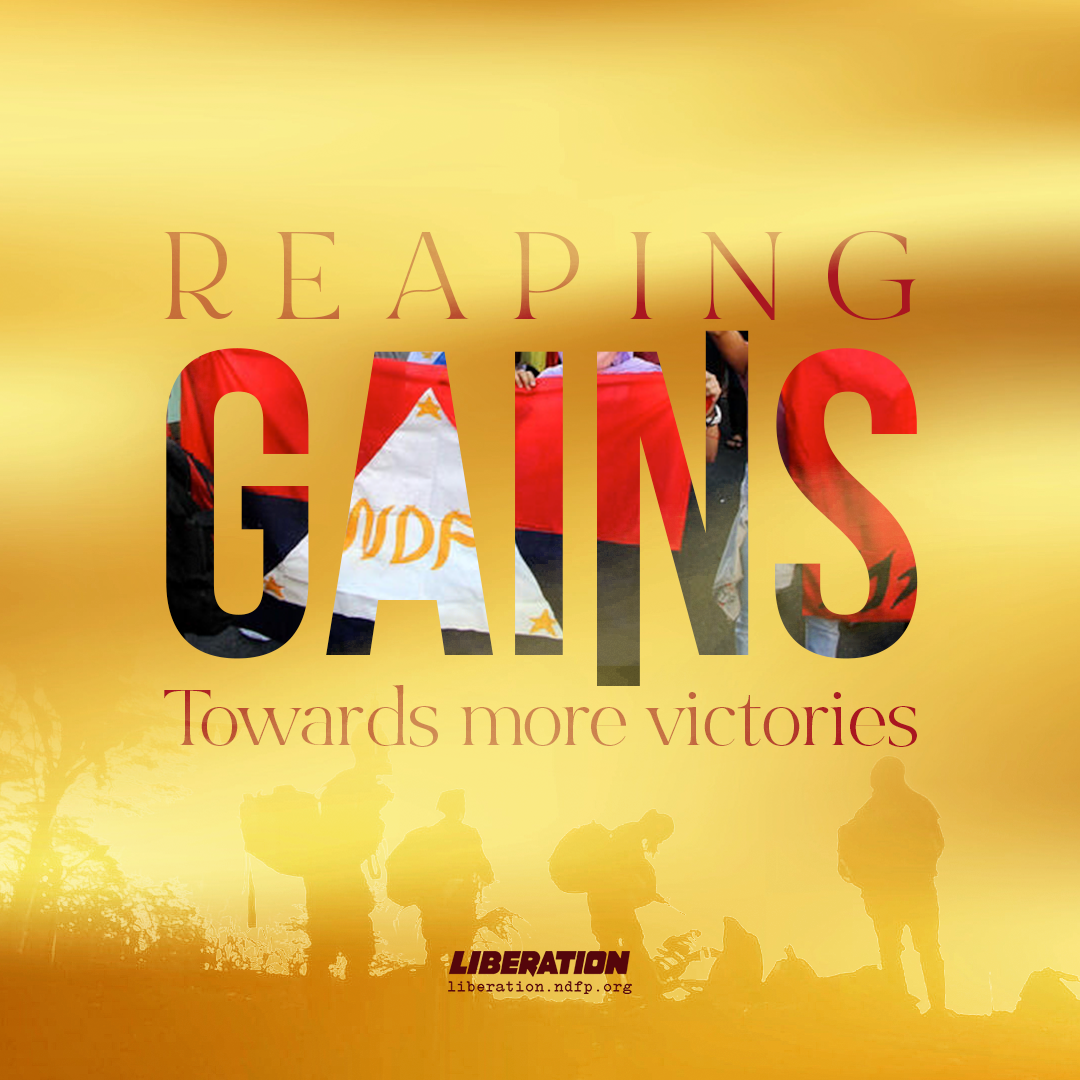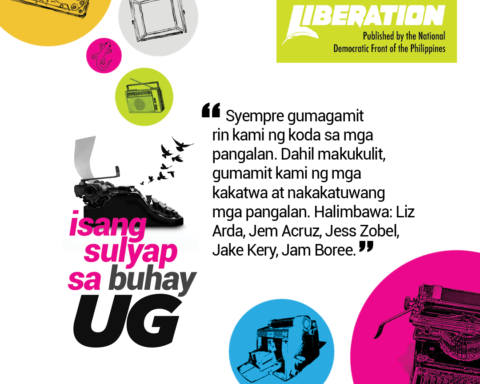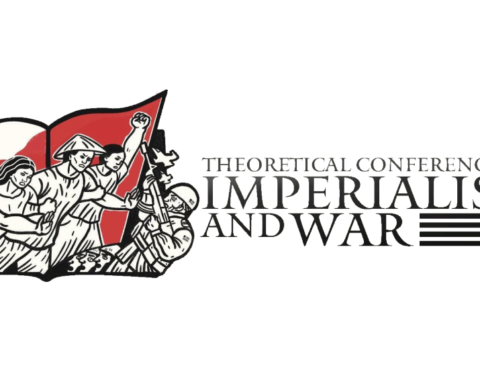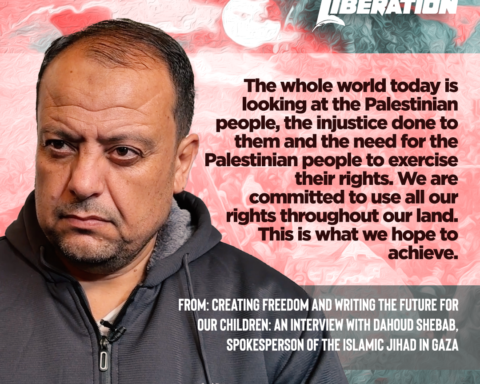In more than five decades of fighting exploitation and oppression, all the activists, Red fighters, critics, supporters and sympathizers of the revolutionary struggle have achieved certain reforms that have provided immediate benefit to the masses. The lessons learned in the course of expanding mass organizations and the mass base have contributed to the advancement of the revolution.
From these lessons we are able to set the conditions for seizing political power and building a new republic that would truly attend to the needs of the masses, free from foreign intervention, feudal and semifeudal exploitation, and corrupt bureaucrats.
Below are some “all-in-50-years-work” trails of achievements of the Philippine revolutionary movement. If you live in a city, chances are you may not know much about these, no thanks to state censorship and vilification campaign against revolutionaries. But these ongoing achievements are also dedicated to you. You have the right to know and—if you will—to join also or support the revolutionaries.
Long live the CPP-NPA-NDFP!
The CPP’s proven resilience, despite the various versions of “all-out war” that have pounded it and the masses it serves and leads, demonstrates the feasibility and acceptability of its programs to resolve the problems plaguing the people. As one comrade once said, “Hindi tayo aabot ng singkwenta kung di tayo mahal ng masa.” Armed with Marxism, Leninism, and Maoism, the tried and tested revolutionary theory and practice that the oppressed people of the world can apply to change their conditions, the Filipino revolutionaries have blazed a trail in waging a communist revolution in the Philippine semifeudal and semicolonial conditions.
Workers of the world unite
Although our people’s war is still at the strategic-defensive stage, it has already contributed to the global anti-imperialist struggle, establishing links with liberation movements and anti-imperialist formations. When the imperialist paid hacks and mercenaries are spreading gloom and doom with their desperate claims against history being written by the masses, let us celebrate and hopefully expand further our contributions to anti-imperialist struggles, our stand versus modern revisionism, and our developing theory and practice of people’s war.
Capacity to forge ahead as revolutionaries
Revolutionary collectives and organizations unite based on clearly defined principles. Members and leaders have equal rights regardless of age, gender preferences, educational attainment, and length of stay or service in the organization. Members and leaders continue to be loyal to the principles of the organization, conscious of what it seeks to achieve and willing to own up, learn from mistakes or dish out and accept criticisms for self-improvement, and also of the revolutionary practice and organizations.
Actual power to the people
At the core of the revolutionary mass base-building is empowerment of the people through mass organizations and organs of political power. In revolutionary guerrilla zones the people practice genuinely democratic elections. Candidates come from mass leaders who have been honed in the day- to-day struggles and who the masses have seen or experienced working with through mass campaigns. The elections of leaders of organs of political power are conducted with transparency: the leaders elected are the most active and/or tried and tested leaders from the mass organizations of youth, students, women, peasants, and workers, professionals such as teachers and health workers, church people and other groups the masses have worked with in the course of implementing land reform and other campaigns toward base-building.
Land reform
At the core of the revolutionary mass base-building is empowerment of the people through mass organizations and organs of political power. In revolutionary guerrilla zones the people practice genuinely democratic elections. Candidates come from mass leaders who have been honed in the day- to-day struggles and who the masses have seen or experienced working with through mass campaigns. The elections of leaders of organs of political power are conducted with transparency: the leaders elected are the most active and/or tried and tested leaders from the mass organizations of youth, students, women, peasants, and workers, professionals such as teachers and health workers, church people and other groups the masses have worked with in the course of implementing land reform and other campaigns toward base-building.
Respecting self-determination and closely working with national minorities
The national minorities in this country have their own socio-political systems, but the Marxist’s concrete analysis of concrete conditions allowed it to unite the national minorities while respecting and joining them in the fight for self-determination. More than the ordinary peasants’ war for land reform and support services, the national democratic revolution is a revolution to reclaim the national minorities’ right to self-determination, protection of their ancestral domain, and self-governance based on their own socio-political systems.
Women empowerment and respect for the rights of the LGBTQ1+
The macho and chauvinist tradition fostered in the semicolonial and semifeudal Philippines is something the national democratic revolutionaries have been consciously pointing out and correcting among themselves, in their day-to-day habits at work in communities and mass organizations where they belong. Many members of the LGBTQI+ community have joined and supported the revolution, where they are encouraged and supported to pursue their gender preferences. Same-sex marriages and romantic relationships between adults are legal and binding among the members of Communist Party of the Philippines.
The New People’s Army have had many notable commanders and officials from among women and members of the LGBTQIA+ community, long before the reactionary armed forces started to open its military schools to women (they have yet to openly welcome and duly respect gays, lesbians and queers in their ranks).
Right to divorce
In revolutionary zones and among members of the revolutionary mass movement, they are serious toward ensuring respect of women and LGBTQIA+, such that they have policies outlined in the document On the Relation of the Sexes (ORS). For revolutionaries, fostering one’s humanity and achieving one’s potentials as they perform their tasks are enhanced and supported also by meaningful relationships. But it also recognizes the right to divorce after careful collective assessments of the involved parties.
In the guerrilla zones in the countryside, members of the people’s army which also perform cultural and socio-economic duties have been requested by mass organizations to help settle marital conflicts of couples who approaching them for advice.
Social services in remote villages
Spread of literacy and numeracy among the people
Revolutionary mass base-building develops as its people and resources develop. As such, the task is inextricably linked to better or more appropriate people’s education, and the CPP, through the NPA and the NDFP allied organizations, strive to help the masses pursue relevant education. Locals who can read and write are obviously sharper citizens and professionals, fighters, and activists. They contribute better at analyzing and improving the situation at workplaces, schools, and communities, advancing the interests of the masses and protecting the gains of the revolutionary mass movement.
Electrification
Depending on the capacities and programs of guerrilla zones, they have put up and experimented with appropriate and sustainable technology benefiting villages. In far-flung areas, mass organizations have brainstormed and implemented various ways for irrigation, bringing potable water to communities, sharing milling equipment and in some villages, they have even put up some community–based electrification projects.
Relief and rehabilitation in disaster areas
Closely working and living with the masses, the revolutionaries have both been surviving with the people and providing leadership to help the masses face typhoons and disasters by harnessing their collective strength. The people have been mobilizing immediate relief and rescue operations and pushing for appropriate rehabilitation, honing their disaster preparedness and engaging various groups as well as the government to raise the issue of genuine disaster preparedness. Relying on the reactionary state, disasters would only get more frequent and destructive and the people would be wholly left to fend for themselves, to become excuses for corruption and for increased deployment of reactionary troops.
The experience of the revolutionaries and the masses in surviving super-typhoon Pablo in 2012 is emblematic of what the revolutionary movement can do and the lowest of the low the reactionaries can sink into.
Traditional medicines and treatment, NPA medics
The NPA double as people’s medics, holding medical missions and treating the sick as they move from one village to the next. They introduce changes in the villages’ healthcare and long experience of no access to health services. The NPA through the medics in their ranks and the members of MASAPA (Makabayang Samahang Pangkalusugan) who trained them have eventually helped the villages form and enable their health committees. MASAPA is an allied organization of the NDFP. They train the NPA and the masses on health and medical work and provide direct health services to Party members, the Red fighters, and masses in guerrilla fronts.
Development and popularization of Filipino language
Precisely because the national democratic revolution is sustained by the masses, their languages and ways of speaking are indispensable at reflecting their common plight, calls, and in building unities. As such the revolutionary movement, without consciously trying for the sake of it, also happens to be contributing much to documenting and actively using and enriching the Filipino languages. In the hands of the revolutionaries and progressives, these languages precisely deliver real news, artworks, analyses, guides and lessons in facing problems from the levels of communities to towns, regions, national and international. The revolutionaries’ official publication Ang Bayan (AB) is issued in English, Filipino and other major languages in the Philippines. Regional publications and other propaganda and educational materials of the revolutionaries also help promote local languages while popularizing Filipino as the national language.
Creativity of the masses
In the five decades of the national democratic revolution, so much creativity of the masses has been unleashed. These are expressed not only through arts and literature, through the skits, plays and songs being performed during gatherings, special occasions, and meetings, through the graphics and social media memes; through catchy slogans and avalanches of satires. In fact, the numerous ways the masses join and support the revolution have also stimulated their creativity—these have found expressions in waging a protracted war in an archipelagic country and navigating through treacherous puppet administrations. Expending efforts to reach out to the rest of the 99%, to launch campaigns in land reform, campaigns in bringing aid, relief and rehabilitation in times of natural and human-made disasters, all these have stoked the Filipino masses’ creativity in manner and forms of organizations and holding mass actions.
Waging the national democratic revolution with socialist perspective and the numerous undertakings of the mass movement toward creating a just and prosperous society are indeed stoking the people’s highest expressions of creativity. (Pinky Ang) ###






